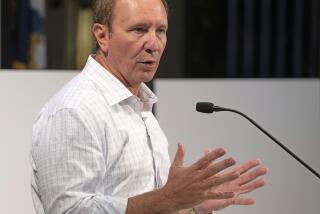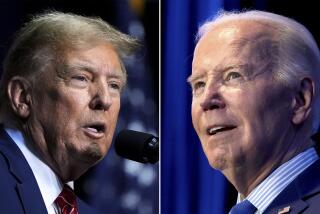Parties in Disarray, Feuds Add Spice to Louisiana Senate Race : ‘Open primary’ system is turning into a free-for-all, with a big chunk of undecided votes. GOP fears it may not even qualify for runoff.
- Share via
NEW ORLEANS — And the leader going into Louisiana’s strange but influential U.S. Senate race on Saturday is . . . Don’t Know/Undecided.
Because this state has the most open of “open primary” systems--with the entire field of candidates competing in a free-for-all regardless of party affiliation--that means just about anything could happen in this early skirmish for control of the U.S. Senate. If nobody wins more than 50% of the vote, the top two finishers, even if they’re from the same party, will meet in the general election.
“It’s a very strange system,” said Jennifer Duffy, who analyzes Senate races for the Washington-based Cook Political Report. “But that’s Louisiana politics.”
Although it was widely believed that the retirement of Democratic veteran J. Bennett Johnston would boost the Deep South’s growing Republican tide, the kaleidoscopic field of 15 contenders instead has been led for much of the last two months by two moderate Democrats, including a woman who helped coordinate President Clinton’s victory here four years ago.
Mary Landrieu, a former state treasurer, is the favorite to qualify for the November runoff. By contrast, the GOP vote has been splintered by six doggedly perseverant candidates, including Louisiana’s best-known yet most-reviled Republican, ex-Ku Klux Klan leader David Duke. The Christian Coalition’s favorite son, state Rep. Woody Jenkins, appears to have broken free from the pack, but it’s still possible that no GOP candidate will earn enough votes to secure a spot in the runoff, setting up a scenario that terrifies national Republican leaders: an election-day contest without any Republicans.
“It all depends on where that chunk of undecided votes goes on Saturday,” said Ed Renwick, director of the Institute of Politics at New Orleans’ Loyola University.
This being Louisiana, the race has been spiced up by a mix of the kind of personal and ideological oddities that have made this state’s politics famous.
There is, to begin with, the state’s attorney general, Richard Ieyoub, a Democrat who seemed almost certain to capture at least second place in the vote until his numbers began sinking amid allegations of improper conduct.
According to the allegations, which have been widely publicized by the New Orleans Times-Picayune, Ieyoub took campaign money in past elections and misspent it on personal items, including a $1,500 Napoleonic-era document and a Chevrolet Suburban that he later turned over to his former wife in a divorce settlement.
Then there is the nasty personal feud between two prominent Democrats stemming from last fall’s election for governor.
Landrieu, the daughter of a popular New Orleans mayor known for his support of civil rights, had been among the leaders in the gubernatorial race until the final days of the primary campaign. Trying to keep Louisiana’s sizable black Democratic vote from being split, she ran ads implying that a vote for Rep. Cleo Fields, who was trying to become the first black governor of the state since Reconstruction, would be wasted. Fields was infuriated and branded her a racist.
Landrieu missed the runoff that time by less than 1%. Angry at Fields, who did make the runoff, she refused to endorse him. Fields went on to be trounced by Mike Foster, a conservative Republican.
Once the Senate campaign began, Fields returned the snub. With Landrieu as the front-runner, buoyed by name recognition and her reform-minded handling of her recent job as state treasurer, Fields threw his support, and presumably that of many black voters, behind Ieyoub, even though Ieyoub is a more conservative Democrat.
The Republicans, meanwhile, have been in even greater disarray than the Democrats. Although Jenkins had the official backing of the state GOP, the national Republican Party initially refused to support him, maintaining its policy of nonintervention in primary races. The state GOP chairman shot back, charging that Sen. Alfonse M. D’Amato of New York, head of the National Republican Senatorial Committee, simply didn’t want to upset his close friend, New Orleans City Councilwoman Peggy Wilson, a Republican also running for the Senate.
The race has been complicated by two millionaires, both of whom are still sinking large sums of money into their campaigns. And then there’s Duke, who is not considered a major threat but still manages to siphon off about 5% or 6% in the polls. The former klan leader first gained prominence nationally when he ran for this same Senate seat in 1990. He then ran for governor in 1991. Each time, moderate voters divided their votes among other candidates, allowing Duke to gain a place in the runoff.
Polls this month have shown that as much as 35% of the vote is still up for grabs. Landrieu has consistently topped the other candidates, drawing about 23% to 27%. Jenkins has been surging, polling from 13% to 18%. He appears to have pulled even with Ieyoub. None of the other candidates has managed to generate more than single-digit support.
“People in Louisiana are less concerned about political parties and labels; they’re more concerned about who they can trust to get the job done,” Landrieu said.
With a new poll being released almost every day, the Louisiana race has become a classic example of how public-opinion surveys sometimes alter reality, not merely reflect it. A few weeks ago, Jenkins was in single digits himself, struggling to coalesce Republican support. A few key endorsements broke the logjam, inching his numbers up. With each jump in the polls, another GOP leader hopped on his bandwagon. Finally, this week, the full muscle of the Republican Party was flexed on his behalf.
Although Jenkins has not even secured a spot in the runoff, vice presidential nominee Jack Kemp introduced him to a GOP rally in New Orleans like this: “Woody, stand up, let everyone see the next U.S. senator.”
As peculiar as it is, the Louisiana race carries special importance to both Democratic and Republican national strategies. It is one of 14 Senate races with no incumbent on the ballot--and one of four in the South vacated by retiring Democrats. The Democrats must defend those seats if they are to have any hope of regaining control of the Senate, and of slowing the Republican Party’s strides in the South.
“This is a conservative state,” Jenkins said. “If you take the leading liberal and the leading conservative, we think we have a great chance--as long as we have that choice.”
The fact that Louisiana voters may not have that choice says less about their political leanings than their unique, sometimes byzantine, system for nominating candidates.
Unlike the open-primary initiative adopted by California voters last March, which will allow members of any party to vote in another party’s primary, Louisiana elections are unfettered, nominally nonpartisan horse races. There are no Democratic or Republican nominees. Everyone is lumped in together, with the top two finishers then going head-to-head.
It was a scheme devised by Louisiana Democrats in the mid-1970s to muscle Republicans out of contention. Rather than give the GOP a 50-50 shot, especially when Republican registration was just 2%, the Democrats turned the party primaries into one mad, wide-open dash.
“We don’t actually vote for candidates around here; we vote against them,” said Genevieve Wheeler, the librarian at Nunez Community College in Chalmette, a blue-collar suburb of New Orleans. “You just go through the list and cross off the ones you couldn’t possibly support.”
(BEGIN TEXT OF INFOBOX / INFOGRAPHIC)
In the Running
These are some of the candidates to watch in Louisiana’s open primary:
Richard Ieyoub: The state’s Democratic attorney general had looked certain to get at least second place but began sinking in the polls amid allegations of improper conduct.
Woody Jenkins: A Republican state representative, Jenkins is the favorite son of the Christian Coalition and appears to have pulled even with Ieyoub.
Mary Landrieu: This Democratic former state treasurer and daughter of a popular New Orleans mayor is the favorite to qualify for a runoff election.
More to Read
Sign up for Essential California
The most important California stories and recommendations in your inbox every morning.
You may occasionally receive promotional content from the Los Angeles Times.













